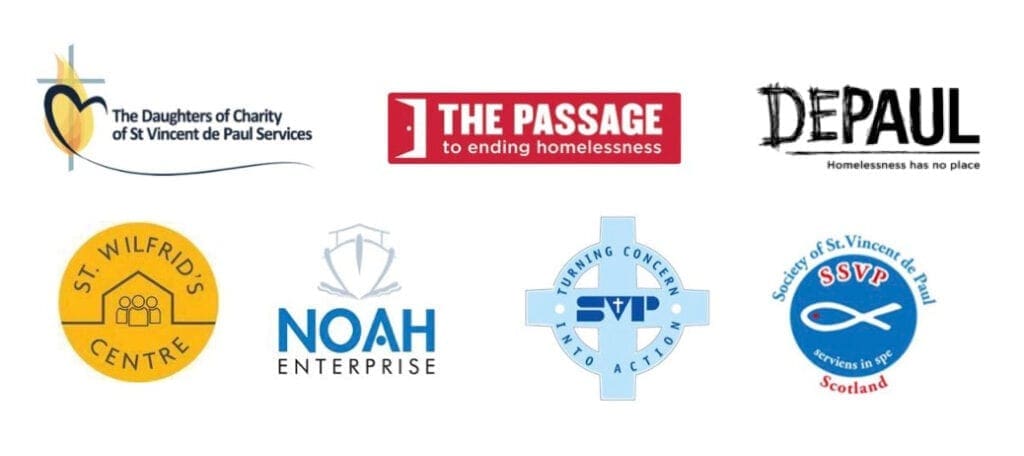PRESS RELEASE
17 FEBRUARY 2021
HOW TO HELP ROUGH SLEEPERS THIS WINTER
Eight Vincentian charities have come together to share advice on what the public can do to help those facing the dangers of sleeping rough in life-threatening cold conditions.
If you have ever passed a homeless person on the street without taking steps to help them, you are not alone. In fact, thousands of people walk past rough sleepers every single day. Perhaps you were unsure of the right thing to do, or you even felt it was not your problem. But the truth is, one simple act can help a person find security, and even save a life.
Rough sleeping can be extremely dangerous and isolating at any time of year, but especially during the winter months when temperatures drop below freezing and health-related risks increase. There were 16,976 alerts about rough sleepers made by the public between April and June 2020, according to StreetLink. Since then, many more people have been pushed into rough sleeping as job insecurity, a general decrease in the nation’s mental health and the long-term economic impact of the Coronavirus pandemic unfolds.
There are many other reasons a person can be driven to the streets. Escaping domestic abuse, social causes, trauma and disabilities are just some of the factors contributing to the rising number of rough sleepers in the UK.
In January, the Government announced additional support to help protect people sleeping rough, including a directive that all councils in England must redouble their efforts to help accommodate those currently living on the streets. The response, which is backed by tens of millions in Government funding, came at the most dangerous time of the pandemic for rough sleepers, who face the new fast-spreading strain of Coronavirus alongside severe cold temperatures.
Homeless charities have welcomed the support package after calling on the Government to provide urgent aid for rough sleepers, but say even more needs to be done to protect those who have no option but to attempt to survive the harsh winter conditions.
So what can you do to help when you next pass a homeless person on the street?
LOG THE SIGHTING ON STREETLINK
StreetLink is a service that enables members of the public to notify authorities of rough sleepers in their area. The app will alert a local support service who will be able to help the person access shelter, food and longer-term solutions to help turn their life around.
Josh Brown, Community Liaison Coordinator at The Passage, leads a small team of staff and volunteers who support people sleeping rough in Victoria. Josh offers the following advice: “if you see someone that you are worried about who is sleeping on the streets, the best course of action you can take to link that person in with support is to download the StreetLink app on your mobile or use the StreetLink website to report the location and details. It is vitally important to include as much information as you can to help identify the person as it helps professionals to find them much quicker to offer support. These details include a street address if possible, details of any landmarks close to where they are bedded down and a description of their appearance, clothing or the colour of their sleeping bag or tent.”
It is good to check with the person if they are happy for you to contact StreetLink on their behalf. For more information, visit www.streetlink.org.uk, or download their mobile app for more information.
ACKNOWLEDGE THEIR PRESENCE AND TREAT THEM WITH COMPASSION
Some rough sleepers spend days being ignored on the streets, so taking the time to be a listening ear or simply offering a smile can go a long way towards making a person’s day. You could strike up a conversation by asking if there is anything they need or if they would like to chat. This offers the opportunity to gauge whether they are willing to talk or accept your support.
UNDERSTAND THE CAUSES OF HOMELESSNESS
Educating yourself about the reasons one might end up homeless, as well as the impact complex trauma can have on a person’s life and its link with homelessness, will help you to find appropriate ways to support and interact with people who are sleeping rough. Head of Welfare Services at NOAH, Paul Prosser, says Homeless Link’s introductory webinar on Trauma Informed Care is a great starting place to develop an understanding of the needs of rough sleepers.
BECOME AND ACTIVIST FOR CHANGE
If we all just react to rough sleeping rather than questioning the causes and issues of homelessness then the situation may never improve, says Director of St Wilfrid’s Centre, Ruth Moore. If we want to see change, we need to think about the political and social situation we live in – and are responsible for – and talk to local councillors and MPs about funding mental health, housing and support services.
DONATE ITEMS
Donating goods is a simple, yet widely beneficial, way to support those affected by homelessness. Your local homeless shelter will likely have a list of items they do and do not accept on their website, and may also indicate items they particularly need. A few staple items that will always be good to donate include new socks, underwear and towels, sealed packets of non-perishable dry food, hats, scarves and gloves (why not have a go at knitting some yourself?) and books in a variety of languages.
Advice from Vincentian charities: Daughters of Charity Services, The Passage, Depaul International, Depaul UK, St Wilfrid’s Centre, NOAH, SVP England and Wales, SSVP Scotland.
*ENDS*
For more information, please contact riana.brown@dcsvpservices.org.








0 Comments